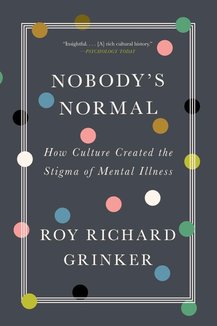Recommended Books

Nobody's Normal: How Culture Created the Stigma of Mental Illness
Author:
Roy Richard Grinker
ISBN 13:
978-1324020134
A compassionate and captivating examination of evolving attitudes toward mental illness throughout history and the fight to end the stigma. For centuries, scientists and society cast moral judgments on anyone deemed mentally ill, confining many to asylums. In Nobody’s Normal , anthropologist Roy Richard Grinker chronicles the progress and setbacks in the struggle against mental-illness stigma―from the eighteenth century, through America’s major wars, and into today’s high-tech economy. Nobody’s Normal argues that stigma is a social process that can be explained through cultural history, a process that began the moment we defined mental illness, that we learn from within our communities, and that we ultimately have the power to change. Though the legacies of shame and secrecy are still with us today, Grinker writes that we are at the cusp of ending the marginalization of the mentally ill. In the twenty-first century, mental illnesses are fast becoming a more accepted and visible part of human diversity. Grinker infuses the book with the personal history of his family’s four generations of involvement in psychiatry, including his grandfather’s analysis with Sigmund Freud, his own daughter’s experience with autism, and culminating in his research on neurodiversity. Drawing on cutting-edge science, historical archives, and cross-cultural research in Africa and Asia, Grinker takes readers on an international journey to discover the origins of, and variances in, our cultural response to neurodiversity. Urgent, eye-opening, and ultimately hopeful, Nobody’s Normal explains how we are transforming mental illness and offers a path to end the shadow of stigma.

American Psychosis: How the Federal Government Destroyed the Mental Illness Treatment System
Author:
E. Fuller Torrey
ISBN 13:
978-0199988716
In 1963, President John F. Kennedy delivered an historic speech on mental illness and retardation. He described sweeping new programs to replace "the shabby treatment of the many millions of the mentally disabled in custodial institutions" with treatment in community mental health centers. This movement, later referred to as "deinstitutionalization," continues to impact mental health care. Though he never publicly acknowledged it, the program was a tribute to Kennedy's sister Rosemary, who was born mildly retarded and developed a schizophrenia-like illness. Terrified she'd become pregnant, Joseph Kennedy arranged for his daughter to receive a lobotomy, which was a disaster and left her severely retarded. Fifty years after Kennedy's speech, E. Fuller Torrey's book provides an inside perspective on the birth of the federal mental health program. On staff at the National Institute of Mental Health when the program was being developed and implemented, Torrey draws on his own first-hand account of the creation and launch of the program, extensive research, one-on-one interviews with people involved, and recently unearthed audiotapes of interviews with major figures involved in the legislation. As such, this book provides historical material previously unavailable to the public. Torrey examines the Kennedys' involvement in the policy, the role of major players, the responsibility of the state versus the federal government in caring for the mentally ill, the political maneuverings required to pass the legislation, and how closing institutions resulted not in better care - as was the aim - but in underfunded programs, neglect, and higher rates of community violence. Many now wonder why public mental illness services are so ineffective. At least one-third of the homeless are seriously mentally ill, jails and prisons are grossly overcrowded, largely because the seriously mentally ill constitute 20 percent of prisoners, and public facilities are overrun by untreated individuals. As Torrey argues, it is imperative to understand how we got here in order to move forward towards providing better care for the most vulnerable.

Crazy: A Father's Search Through America's Mental Health Madness
Author:
Pete Earley
ISBN 13:
978-0425213896
“A magnificent gift to those of us who love someone who has a mental illness…Earley has used his considerable skills to meticulously research why the mental health system is so profoundly broken.”—Bebe Moore Campbell, author of 72 Hour Hold Former Washington Post reporter Pete Earley had written extensively about the criminal justice system. But it was only when his own son—in the throes of a manic episode—broke into a neighbor's house that he learned what happens to mentally ill people who break a law. This is the Earley family's compelling story, a troubling look at bureaucratic apathy and the countless thousands who suffer confinement instead of care, brutal conditions instead of treatment, in the “revolving doors” between hospital and jail. With mass deinstitutionalization, large numbers of state mental patients are homeless or in jail-an experience little better than the horrors of a century ago. Earley takes us directly into that experience—and into that of a father and award-winning journalist trying to fight for a better way.